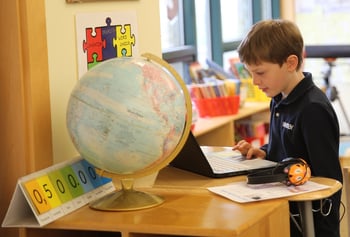Defining “student success” is one of the biggest moving targets out there. Most policymakers focus on quantifiable data such as grade point averages and standardized tests, but those only provide part of the picture, especially at the elementary level.
 At Whitby, we think it’s important to go beyond just numbers to determine if we’re setting up children for success. Do kids feel challenged in school? Are they learning to be principled, global citizens and developing the interpersonal skills they need to succeed? Are they becoming critical thinkers? Are they prepared for what comes next in their lives and academic paths? Can they adapt quickly to change and figure out how to overcome unexpected challenges?
At Whitby, we think it’s important to go beyond just numbers to determine if we’re setting up children for success. Do kids feel challenged in school? Are they learning to be principled, global citizens and developing the interpersonal skills they need to succeed? Are they becoming critical thinkers? Are they prepared for what comes next in their lives and academic paths? Can they adapt quickly to change and figure out how to overcome unexpected challenges?
Here are the 6 things we believe are key to elementary school student success:
1. Committed Educators
We believe the best teachers not only genuinely enjoy working with students, but love learning themselves. We look for teachers who enjoy continuing their own educational and professional development by learning new methods and boosting their own knowledge. Those are also the educators who love to wear extra ‘hats’ as mentors, coaches, and cheerleaders. We’ve found that when teachers model a love of learning for students, their students also develop a love of learning.
2. Empowered Students
Whitby students are encouraged to seek their own answers – and to ask their own questions as well. This is important because curiosity is key to developing intrinsic motivation for learning. Researchers have found that when students are motivated to learn by their own curiosity, they perform better academically than students who are purely focused on achieving high test and G.P.A. scores. Both the Montessori and IB programs focus on developing curiosity, and challenging students to explore subjects.
3. A Strong Community
The old adage “It take a village to raise a child” is true. We’ve found that when parents, educators, and school administrators band together, students achieve more. That’s why we encourage parents to volunteer in the classroom, become involved on parent committees and to get to know other families. Researchers have also found, in a 10 year study of elementary schools in Chicago, that the most successful schools are filled with teachers and school administrators passionate about creating a safe, focused, and academically rigorous environment.
It’s clear that the more that students are surrounded by people who value learning, the more motivated they are to succeed.
4. A Global Focus
The more connected the world becomes, the more important it is for students to learn about other cultures from a young age and develop a global perspective. Children actually begin to distinguish their culture from others as young as preschool and this helps them see the world through different lenses.
We believe elementary school students today should have an opportunity to look beyond U.S. borders to learn how other cultures interact, play and learn -- and most importantly, how they think about the world.
5. Education that Extends Beyond the School Day
The traditional American model of education has a shorter day than some Asian or European schools, where students attend classes from sun-up to sun-down. We believe it’s important to give elementary school students a break from the classroom, but that learning doesn’t have to end when the school days does.
After school activities can be “fun” and social while still extending and reinforcing what students learn in the classroom — such as programming video games to creating comics or furthering their knowledge of literature through theater.
6. Personalized Attention
Elementary school students shouldn’t have to compete with 30-plus other students for the attention of one teacher. The National Education Center Research recently found that students are more engaged and achieve more when they learn in smaller classes — and we agree.
In our Lower School, where we have two fully-certified educators in every classroom, teachers are able to spend a significant amount of time with each student and can tailor their instruction to individual student learning styles. It makes a difference. Students feel like they have the time to actually talk to a teacher whenever they need more support in a given area. It also give our educators more opportunities to challenge students who quickly grasp a new concept.
A Recipe for Student Success
At Whitby, we constantly think about how to set students up for success in school, and throughout their life. That goes far beyond teaching them to take tests well. Student success come from giving children the tools to be confident learners and surrounding them with a community committed to helping them learn. We want our elementary school students to head into middle school curious and skilled at thinking, and able to see the world from different perspectives.


